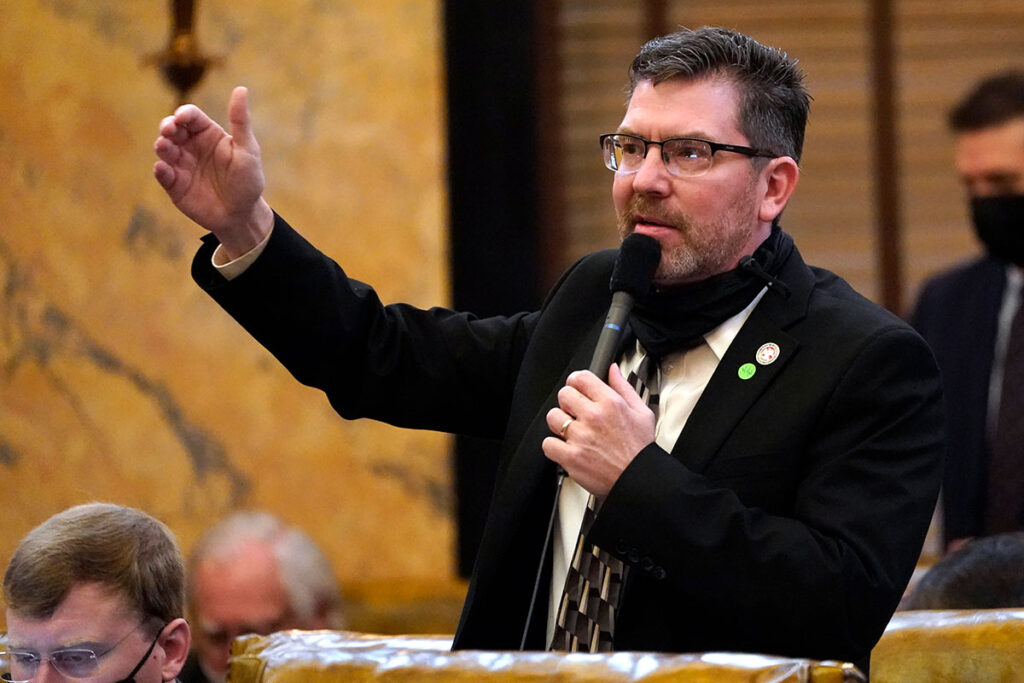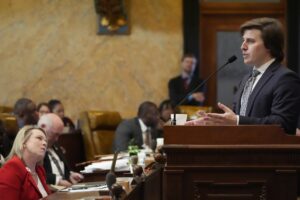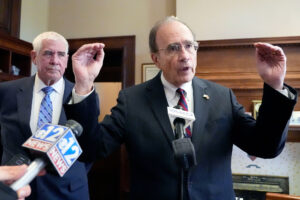Adults who transport other people’s minor children across Mississippi state lines to get an abortion without permission could face criminal charges for “abortion trafficking” under a bill a Republican state representative introduced this week. It’s one of several abortion-related bills lawmakers introduced in the House in January, alongside bans on advertising abortion information and mail-order abortion pills.
House Bill 713, which Rep. Dan Eubanks of DeSoto County introduced in the House on Jan. 29, says that an adult who is not a child’s parent and tries “to conceal an abortion from the parents or guardian of a pregnant, unemancipated minor” by helping the child obtain an abortion or “abortion-inducing drug” would be committing the crime of “abortion trafficking.” An offender could face fines of up to $10,000 or two to five years of imprisonment, including for cases in which they helped a child obtain an abortion in Mississippi—where nearly all abortions are banned. The bill would not prevent parents or guardians from taking their child to get an abortion.
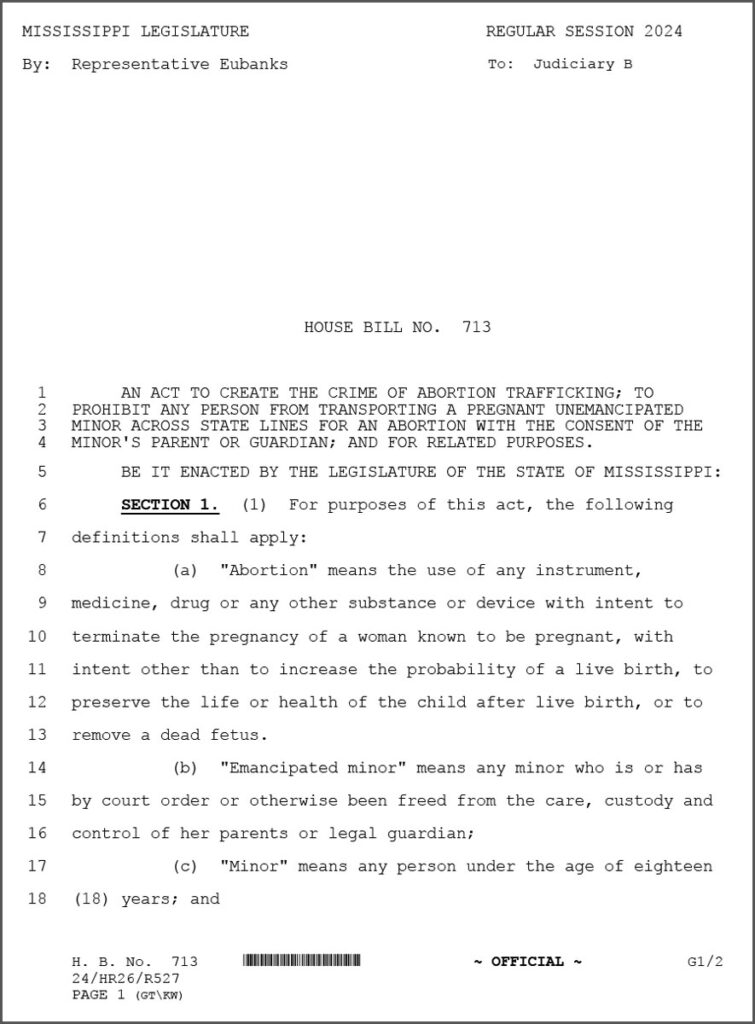
Mississippi Reproductive Freedom Fund Executive Director Laurie Bertram Roberts said H.B. 713 “does nothing” for youth in foster care who are pregnant and seeking abortions because they cannot ask their parents or guardians to take them.
“If you’re a foster kid, you already have a lot going on and you should be able to have the autonomy to decide whether you want to be a parent yet because the odds are stacked against them for them to be able to keep their baby if they give birth,” she told the Mississippi Free Press on Thursday morning. “To hold them hostage and make them give birth is so cruel.”
Making it harder for teenagers to get abortions would not prevent teens from ending their pregnancies themselves, Roberts noted.
“We know that from the history of abortion bans that when you ban abortion access for teenagers, they can and will take drastic steps to end their pregnancies and we don’t want that,” she said. “Why would we want that?”
Roberts said it was contradictory that minors can consent to birth control and care during pregnancy, which is more strenuous on the body, but they cannot go out of state to get an abortion.
Eubanks did not respond to a request for this story by press time.
Banning ‘Mail-Order’ Abortion Medicine
Manufacturing abortion pills in the state or distributing them through mail order, including from out-of-state, would be criminalized under House Bill 735—another bill Rep. Eubanks introduced on Jan. 29. Under it, anyone who “manufactures, markets, mails, distributes, transports (or) delivers … any instrument or article, or any drug or medicine, for causing an abortion that is prohibited in this state” would be guilty of a felony and either be charged up to $10,000 or jailed for two to five years. People who advertise for abortion-causing medicines or devices would also be guilty under H.B. 735.
Abortions in Mississippi are illegal at all stages, with an exception for cases of rape until fetal cardiac activity becomes detectable (around six weeks gestation) and a vague exception for cases in which a pregnant person’s life is at risk.
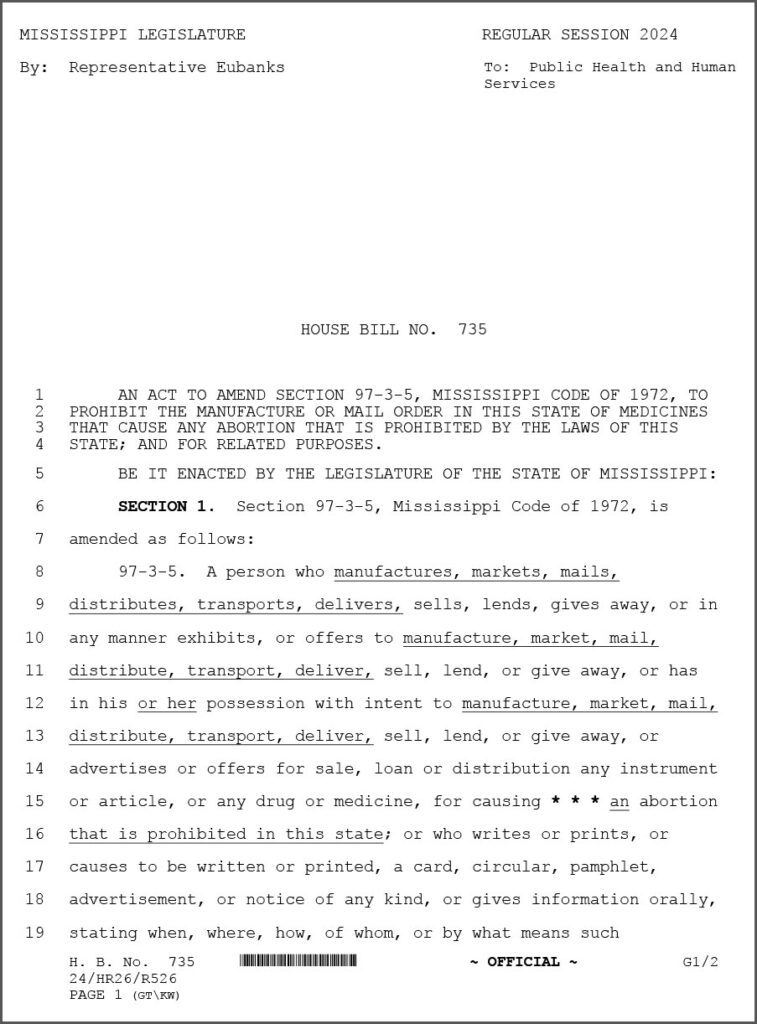
Laurie Bertram Roberts said “anti-abortion” lawmakers are never going to be satisfied and will continue reducing citizens’ freedom.
“All these bills just show how scared they are of people having their own autonomy even after they’ve already banned abortion in the state,” she said today. “How much further are they going to go?”
Roberts said that lawmakers start with rolling back policies for minors with “faux concern about minor safety” and will then pivot to restricting adults’ rights, too.
Potential Abortion Ad Ban
Advertisements for abortions and “abortion related services” could also be banned in Mississippi under a bill Rep. Gene Newman, R-Pearl, introduced in the Mississippi House on Jan. 17.
The U.S. Supreme Court overturned Roe v. Wade in June 2022 in the Mississippi case Dobbs v. Jackson Women’s Health Organization, allowing states to ban abortion at all stages of pregnancy. Soon after, Mississippi enacted its near total abortion ban, forcing the state’s only abortion clinic to shut down. Currently, people can still advertise for abortion services that are available out of state as well as provide information on how to find emergency contraception.
Newman’s House Bill 31 would allow authorities to charge an individual with a misdemeanor for advertising where or how a person can get an abortion or “abortion related service” if it “is prohibited by state law.” Law enforcement would be able to charge a business or other organization with a felony for violating H.B. 31.
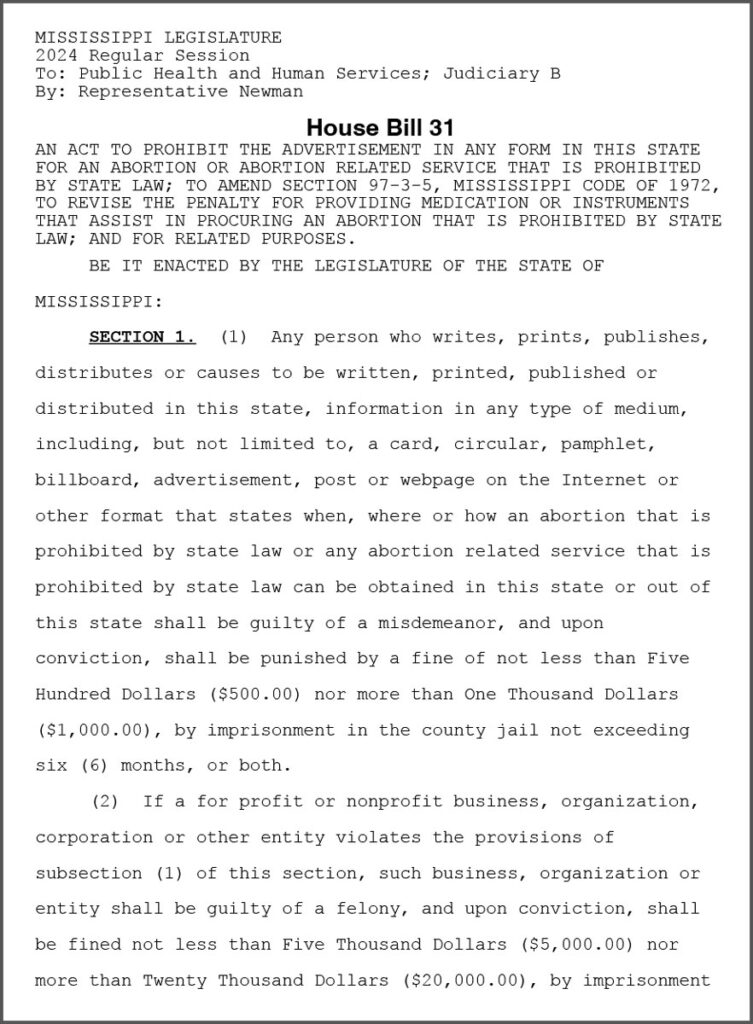
The bill would affect all advertisements in Mississippi for abortions and related services, including online, print, radio and television advertisements.
People who sell, give away or offer to sell any device or drug that could cause an abortion would be charged with a misdemeanor if H.B. 31 became law. H.B. 31 would ban a person from advertising in any medium about how a person can obtain abortion-causing devices or medication.
Laurie Bertram Roberts said some Republican lawmakers are continuing to attack reproductive rights to gain favor with their “anti-abortion” constituents.
“They’ve been dining out on abortion politics and using that as a wedge issue that helps get them get votes for a very long time, and I don’t think they know how to pivot to anything else because nothing else has worked as well for them,” she told the Mississippi Free Press on Tuesday.
Regulating Online Advertising
Rep. Gene Newman told the Mississippi Free Press he had not seen any printed advertisements for abortions or related services in Mississippi, but that he has noticed many ads on Google when browsing the internet. He said “pro-abortion groups” and abortion clinics overspend on advertisements to ensure their ads show prominently online.
“I don’t believe they should be advertising in some place where abortion is illegal,” the Rankin County representative told the Mississippi Free Press on Tuesday. “I mean, you can’t advertise in Mississippi to sell cocaine; you can’t advertise in Mississippi to sell heroin. I mean, you shouldn’t be able to advertise for something that’s illegal.”
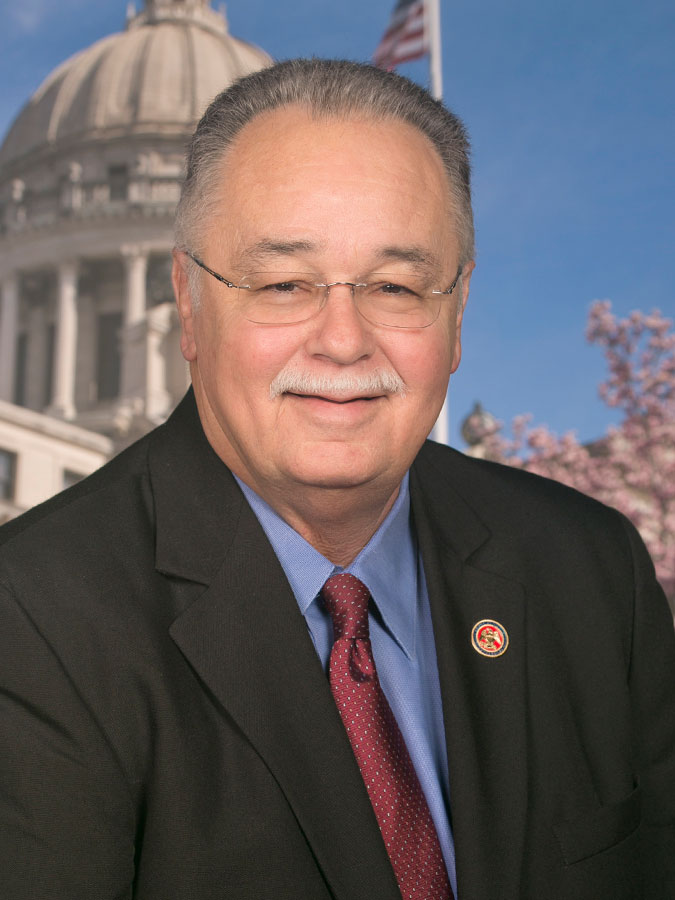
But Laurie Bertram Roberts, who called H.B. 31 a violation of free speech, was skeptical about how state lawmakers could regulate online advertisements.
“Exactly how are they planning on enforcing the internet? The internet is not state specific,” the director told the Mississippi Free Press on Tuesday. “You might be seeing something online, but it can come from anywhere.”
‘Committed to Oppressing People’
The Mississippi Reproductive Freedom Fund offers financial assistance and support to people seeking abortions, gives out free emergency contraception, teaches community-based comprehensive sex education, gives out period supplies and diapers and advocates for reproductive justice in Mississippi. Laurie Bertram Roberts said that H.B. 31 could stop some of the fund’s work.
“It would put all the work we do around abortion in jeopardy,” she said on Tuesday. “We’re not going anywhere, though; we do other work.”
Roberts said many Republican lawmakers are continuing to attack reproductive rights a year and a half after the U.S. Supreme Court overturned Roe v. Wade. And they will not stop until they roll back reproductive health policies, she added. She encouraged citizens to watch for legislation that restricts reproductive and free speech rights.
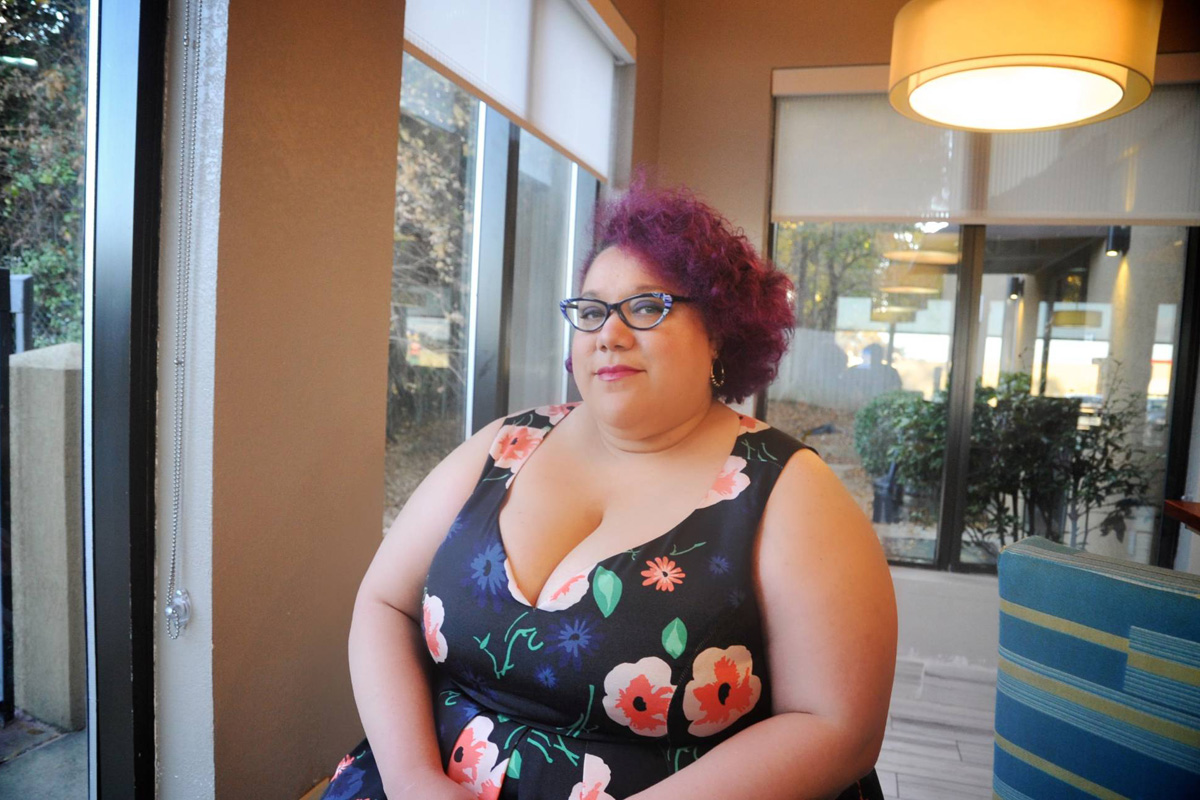
Out-of-state advocacy organizations often contribute to Mississippi legislation by sponsoring bills for lawmakers to add their names to. Roberts said bills like H.B. 31, 713 and H.B. 735 are a “national strategy” from the GOP and anti-abortion organizations to get votes for Republicans.
“This group of bills that are coming out right now proves a couple of things that we’ve already said. One is that they weren’t going to be satisfied with just banning abortion; they’re completely committed to oppressing people and making sure people have no access whatsoever,” she said on Tuesday.
No other representatives have signed onto H.B. 31 with Newman. The abortion advertising ban is now in the House Public Health and Human Services Committee, chaired by Rep. Samuel Creekmore IV, R-New Albany.
Rep. Eubanks is the sole author of H.B. 713, the “abortion trafficking” bill, and H.B. 735, the bill banning mail-order abortion pills. H.B. 713 is in the House Judiciary B Committee, chaired by Rep. Kevin Horan, R-Grenada. H.B. 735 is in the House Public Health and Human Services Committee.
All three bills must advance out of their respective committees and to the House floor to survive a March 5 deadline. So far, none of the bills have received a committee vote. If any of the bills do advance and receive approval in the House, they will still need to pass the Mississippi Senate and earn Gov. Tate Reeves’ signature to become law.
Last month, the Mississippi House passed a bill to restore the state’s ballot initiative system, but with prohibitions on allowing voters to use it to change the state’s abortion laws. In 2011, Mississippians defeated a ballot initiative that would have made all abortions illegal at the time.


